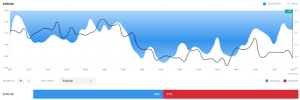Caught Between a Rock and a Hard Place
Russia’s invasion of Ukraine aggravated what was already a tricky scenario for policymakers, pushing the EU into the dilemma of curbing inflation without dampening economic growth.
Skyrocketing natural gas prices have made inflation the most burning issue for policymakers. The only weapon in the ECB’s arsenal is its benchmark interest rate. Higher interest rates curb inflation by dampening demand. However, lower consumer spending slows economic growth.
Are the Markets Overreacting?
The situation is worrisome but not without silver linings. There are a few bright factors that could help the common bloc stave off a technical recession.
Slow & Steady
To begin with, the ECB has moved cautiously. Developments on the other side of the pond indicate how jittery policymakers can get. The US Federal Reserve has already hiked rates to 3%-3.25%.
The ECB raised rates, but very gradually, from -0.5% to 0% in July and then from 0% to 0.75% in September. Despite these hikes, the benchmark rate remains well below what economists widely suggest is an economy’s neutral rate (which represents neither stimulation nor tightening), at about 1.5%. This gives the ECB ample room for further tightening.
What’s Recession Anyway?
The term recession is often used rather loosely to mean a slowdown in economic growth or even a brief period of contraction. However, by definition, recession is two consecutive quarters of negative growth, which didn’t even happen during the pandemic slowdown.
A Resilient Economy
Notwithstanding the Russia-Ukraine war, the European economy delivered robust growth in the first half of 2022, triggered by strong trade and some opening of supply chain bottlenecks. In addition, the easing of covid-related restrictions helped a rebound in contact-based service industries, such as tourism. The recovery in turn helped tourism-dependent countries like Greece, where summer tourism is estimated to be higher than the pre-pandemic levels. This is also reflected in the overly positive sentiment for the EU, as seen in Acuity’s Sentiment Widget.


